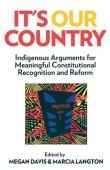 407230470499432842.jpg
407230470499432842.jpg
This image has been sourced from MUP Books with Spine website
y
 It's Our Country Too : Indigenous Arguments for Meaningful Constitutional Recognition and Reform
anthology
It's Our Country Too : Indigenous Arguments for Meaningful Constitutional Recognition and Reform
anthology
 It's Our Country Too : Indigenous Arguments for Meaningful Constitutional Recognition and Reform
anthology
It's Our Country Too : Indigenous Arguments for Meaningful Constitutional Recognition and Reform
anthology
Issue Details:
First known date:
2016...
2016
It's Our Country Too : Indigenous Arguments for Meaningful Constitutional Recognition and Reform

